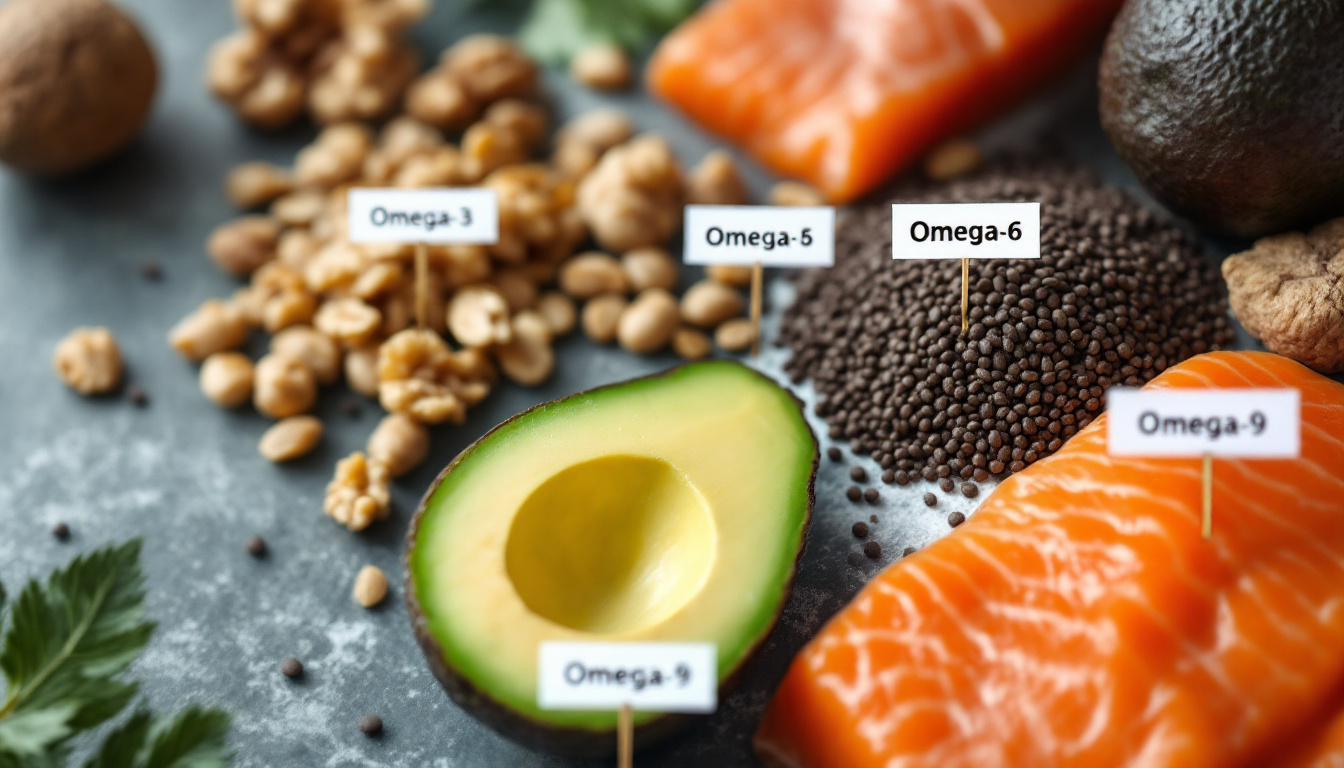When it comes to essential fatty acids, the terms "Omega 3," "Omega 6," and "Omega 9" often come up in discussions about nutrition and health. These fatty acids play crucial roles in our bodies, contributing to everything from heart health to brain function. But what exactly are they, and how can we ensure we're getting enough of them? Let's dive into the world of Omega fatty acids and explore their benefits, sources, and more.
Understanding Omega Fatty Acids
Omega fatty acids are categorized based on the position of the first double bond in their chemical structure. This classification leads to three main types: Omega 3, Omega 6, and Omega 9. Each type has unique properties and health benefits.

Omega 3 Fatty Acids
Omega 3 fatty acids are polyunsaturated fats that are essential for human health. They are not produced by the body, which means we must obtain them through our diet. The most well-known Omega 3s include EPA (eicosapentaenoic acid) and DHA (docosahexaenoic acid), primarily found in fish, and ALA (alpha-linolenic acid), which is found in plant sources.
Research suggests that Omega 3 fatty acids may help support heart health by reducing triglyceride levels and lowering blood pressure. Additionally, they are known for their anti-inflammatory properties, which can be beneficial for conditions like arthritis.
Omega 6 Fatty Acids
Omega 6 fatty acids are also polyunsaturated fats, and like Omega 3s, they are essential for our health. The most common Omega 6 fatty acid is linoleic acid (LA), which is found in various vegetable oils, nuts, and seeds. While Omega 6s are important for brain function and growth, the typical Western diet often contains an excess of Omega 6 compared to Omega 3, which can lead to an imbalance.
Maintaining a proper ratio of Omega 6 to Omega 3 is crucial, as excessive Omega 6 intake may promote inflammation in the body. This imbalance has been linked to various chronic diseases, including heart disease and obesity.
Omega 9 Fatty Acids
Unlike Omega 3 and Omega 6, Omega 9 fatty acids are monounsaturated fats, which means our bodies can produce them. The most common Omega 9 is oleic acid, found in olive oil, avocados, and nuts. While not essential, Omega 9s can still provide health benefits, such as improving heart health and reducing inflammation.
Incorporating Omega 9 fatty acids into your diet can help maintain healthy cholesterol levels and support overall cardiovascular health.
Health Benefits of Omega 3-6-9
The combined benefits of Omega 3, 6, and 9 fatty acids can significantly impact overall health. Here are some of the key benefits associated with these essential fats:
Heart Health
Numerous studies have shown that Omega 3 fatty acids can help lower the risk of heart disease. They may reduce blood pressure, decrease triglycerides, and improve overall cholesterol levels. Omega 6 fatty acids, when consumed in moderation, can also contribute to heart health by supporting healthy blood circulation.
Brain Function
Omega 3 fatty acids, particularly DHA, are vital for brain health. They are integral to the structure of brain cells and are believed to play a role in cognitive function and mental health. Some research suggests that adequate Omega 3 intake may help reduce the risk of cognitive decline and support mood regulation.
Anti-Inflammatory Properties
Both Omega 3 and Omega 6 fatty acids have been shown to possess anti-inflammatory properties. This can be particularly beneficial for individuals suffering from chronic inflammatory conditions, such as arthritis. Omega 9s also contribute to reducing inflammation, making them a valuable addition to a balanced diet.
Sources of Omega 3-6-9
Incorporating a variety of foods into your diet can help ensure you receive adequate amounts of Omega 3, 6, and 9 fatty acids. Here are some excellent sources for each type:

Sources of Omega 3
- Fatty fish (salmon, mackerel, sardines)
- Chia seeds
- Flaxseeds
- Walnuts
- Algal oil (a plant-based source of DHA)
Sources of Omega 6
- Vegetable oils (sunflower, corn, soybean)
- Nuts (walnuts, pine nuts)
- Seeds (pumpkin seeds, sesame seeds)
- Meat and poultry
Sources of Omega 9
- Olive oil
- Avocados
- Nuts (almonds, hazelnuts)
- Canola oil
Supplement Sources
Supplementation is also a great way to ensure you're getting enough Omega fatty acids in your diet. Learn how supplements can combine Omega 3-6-9 into one easy tablet, ensuring you're maximizing their benefits for focus, memory, and more.
How to Incorporate Omega Fatty Acids into Your Diet
Adding Omega 3, 6, and 9 fatty acids to your diet can be simple and delicious. Here are some practical tips:
Include Fatty Fish in Your Meals
Try to consume fatty fish at least twice a week. Grilling, baking, or steaming fish can help retain its healthy fats while providing a flavorful meal option.
Snack on Nuts and Seeds
Incorporate a variety of nuts and seeds into your snacks or meals. A handful of walnuts or a sprinkle of chia seeds on your yogurt can boost your Omega intake significantly.
Use Healthy Oils for Cooking
Opt for olive oil or avocado oil when cooking or dressing salads. These oils are rich in Omega 9 and can enhance the flavor of your dishes while providing health benefits.
Making It Easy to Your Optimize Your Omega Intake
In summary, Omega 3, 6, and 9 fatty acids are essential components of a healthy diet. They offer numerous health benefits, from supporting heart health to promoting brain function. By incorporating a variety of food sources into your meals, you can ensure that you are getting the right balance of these vital nutrients. Remember, moderation is key, and maintaining a proper ratio of Omega 3 to Omega 6 is crucial for optimal health.




